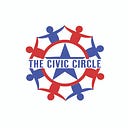Democracy in Seven Steps
By Eliza Newlin Carney
The seven “steps to democracy” at the heart of The Civic Circle’s arts education program were designed for kids, but they are equally relevant to adults, and to the movement to revive democracy. As Civic Circle founder and president Eliza Newlin Carney writes in The Fulcrum: “Adults, too, are missing basic democracy tools — fed up with government, but often clueless how to engage with it. Democracy reform should focus not only on fixing institutions, but also on empowering voters to more effectively press the levers of power, and to work the existing system.”
The Civic Circle’s seven steps progress from the easiest to the hardest, and cut across ideology, promoting civil discourse (Listen!), media literacy (Learn!), voting (Choose!), voluntarism (Join!), advocacy (Speak!), organizing (Act!) and running for office (Lead!). The article spotlights a new generation of democracy groups, from Better Angels to Weave, that have set out to strengthen the body politic one citizen at a time. As Carney writes, Americans “who figure out how to listen first, learn the facts, choose their representatives, take part in community, speak out, organize and assume public leadership — they’re the ones who will have the tools to transform democracy and civic life.” Read the whole story HERE.
BRING BACK THE HUMANITIES. In introducing The Purple Project for Democracy, a new left-right group to “rediscover and recommit to our democratic values and institutions,” journalist and co-founder Bob Garfield bemoans the way schools have devalued civic education. “Amid obsession with science, technology, engineering and math and endless standardizing testing, social studies has been marginalized in public schools and civics education is on a milk carton,” writes Garfield in USA Today.
SOCIETIES MUST LISTEN FIRST. You may or may not agree with writer Sebastian Junger, best known for his ripping sea tale “The Perfect Storm,” that genetics substantially shape our political views. But in making his case that biology is political destiny, Junger makes a compelling argument that all societies must reconcile diverging viewpoints. As Junger writes in The Washington Post: “The task for every society, from the earliest Homo sapiens of Africa to Americans of the 21st century, is to accommodate different values and worldviews into one ethos.”
CITIZEN JOURNALIST POWER. The news industry has been hemorrhaging credibility and readers, and news consumers are awash in disinformation. But here’s a win-win: Media outlets that engage communities in news gathering promote both trust and civic engagement. As Darryl Holliday, co-founder of the civic journalism lab City Bureau puts it: “People are not powerless players; they can actively bring their assets to strengthen their communities and our shared work as journalists covering them.” Read more at the Local News Lab.
Eliza Newlin Carney is founder and president of The Civic Circle. She also writes the Democracy Rules column for The American Prospect.
This post was distributed via The Civic Circle’s newsletter, The Civic Voice. To sign up, please contact ecarney@theciviccircle.org.
